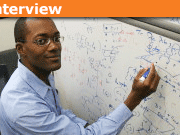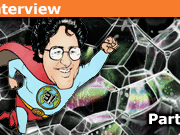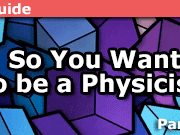Interview with a Physicist: ZapperZ
This is a new Interview category for Insights. While I line up some great new interviews I’ll be migrating some previous mentor interviews.
ZapperZ is a staff emeritus at Physics Forums
Can you give us a brief history of ZapperZ?
Without reveal things that are answers to a few of the security questions to my accounts, I would say that growing up, I had no intention of being a physicist. In fact, my early ambition was to be an engineer or an architect. I remember vividly when I was a child playing with Matchbox cars. I used to collect all these hard-cover books, dominoes, wood blocks, and anything else that I could find to build these huge and elaborately complex “parking garage” with twisted driveways, just to park all of 2 Matchbox cars! The engineering desire won out early in my undergraduate years and I was a freshman majoring in nuclear engineering. However, a year into it, I switched major to physics after taking undergraduate intro physics and realizing that physics was what I wanted to study all along.
I received my B.Sc and Ph.D in physics. My Ph.D research was in tunneling spectroscopy of High-Tc superconductors, which back in the 90s, was still a very hot area of research. As I was about to complete my education, I was at a proverbial fork in the road. I had a job offer at a semiconductor high-tech company, or a postdoc position to do work at Brookhaven. The former meant moving to another state and a generous paycheck (when compared to the measly stipend as a graduate student), while the latter also required a move to another state with a more modest income, and a temporary position. It took a lot of soul-searching, and it was the hardest decision that I had to make. While to others, it was almost a no-brainer on which to accept. deep down inside, I really wanted to pursue a career in research and investigation, even though that career path would not be easy. So I turned down a more lucrative offer and lived the life of a poor postdoc for the next 3 years. This was one of the most productive years of my life. We published 2 PRL papers, 1 Nature paper, and a couple of other papers in smaller journals. I also got to learn a whole slew of experimental techniques and diagnostics that became the most important skills of my career.
At the end of my stint at Brookhaven, I came back to the Chicago area and accepted a position at Argonne, but with a change in fields. I went from being a condensed matter physicist to an accelerator physicist. This meant that I had to learn, and learn quickly, a new area of study. Luckily, I had help, and my background as a condensed matter physicist was actually crucial in this new field. I managed to tackled a number of problems due to my knowledge of material physics. I remained in that position until late last year when I accepted a research faculty position at a local university.
How did you become so interested in all things Disney?
I was not a Disney “fanatic” as a child. In fact, I wasn’t even fond of Disney cartoons (I’m more of a Looney Tunes fan). However, on my 2nd trip to Walt Disney World as an adult in 2001, I fell in love with the place for some odd reason. I went with friends who knew the place inside out, and pointed out all the small details, the stories, and the significance of many parts of the theme park. It opened my eyes to how wonderful the place was. This “addiction” is rather strange because Disney and its insistence on the belief in “magic” is the antithesis of my profession as a physicist. Nevertheless, emotional attachment can often be irrational, which is something I accept. I love it, but I try not to take it too seriously, and this allows me the ability to enjoy the whole immersive experience.
However, the one trait that I found in common between Disney and physics is the attention to detail. As Mies Van de Rohe often used to say, “God is in the details”. I admire that quality about Disney theme parks where there are numerous amount of attention paid to the details that most guests are not even aware of. Their insistence on doing such details, even when most guests are oblivious to them, shows an exacting and uncompromising standard that all other theme parks simply can’t measure up to.
The very same attention to details in physics is where we discover new things, learn new physics, and when we make something clicks. It is when we understand the intricate details of a phenomenon or a theory that we start to have an understanding beyond just something superficial.
I hear you have an amazing Disney pin collection. Tell us about it and how you collect.
Oh geeze! :)
Disney has produced a gazillion pins of different types, varieties, and occasions, and they continue to do so. So inevitably, there are people who collect them, and most collect certain themes, characters, etc. I started to seriously become a Disney pin collector after attending a pin event at Epcot in 2005. It was a slippery slope, and I became a full blown collector after that. What I enjoy most is the pin trading, both with other Disney pin collectors and Disney cast members. I thoroughly enjoy the social aspect of pin trading, being able to approach another Disney fan or cast members and trade pins, talk about our addictions (misery loves company), and basically meet new people. Since becoming a Disney pin collector and trader, my circle of extended family has expanded considerably. I have many people who I’ve met through pin trading who have become practically my family.
And for the record, my collect Donald Duck, The Fab 5, and Disney park icons pins. Anyone has any to trade?
What were some of your biggest challenges in completing your PhD in physics?
There was a major challenged in STARTING my PhD, which was the qualifying exam (which is a challenge to most students). However, I don’t recall any challenges to completing my PhD. By the time I finished writing my thesis and ready to do my defense, I was quite comfortable with my grasp of the knowledge and my ability to present it in front of an audience and the thesis committee member. I knew that the only thing that would prevent me from graduating was if I were to fall flat on my face and did a disastrous job in my defense. I don’t think my situation here was unique to me since I think that is a normal case for many people who were about to finish their Physics PhD.
Which physicists were most important to you while growing up and through your studies?
I didn’t have any “hero” physicist when I was growing up. As I said earlier, I didn’t have any intention of being a physicist.
During my studies in college, I came to admire John Bardeen considerably. Here was someone who is not a household name but has had more impact on our human civilization than almost all other physicists: (i) the only person who won the Nobel Prize in physics twice; (ii) part of a trio what invented the transistor; (iii) formulated the theory of superconductivity (BCS theory) that has such a wide-ranging impact into many other areas of physics. Yet, with all of his accomplishments, he was a very down-to-earth, decent person with hardly any eccentricity.
As a physicist, what are your job responsiblities and what is your daily work day like?
Being new to the world of academia, I’m still finding my way around. I supervise the work of 2 graduate students, one about to finish his PhD. I also supervise a few experimental work, wrote a couple of funding proposal (not easy in this climate of budget sequestration), and generally try to come up with new projects that we can do. That last part isn’t as easy as it sounds. While I have plenty of things I would like to do, the reality of the job dictates that what can be done requires the availability of manpower, equipment, and funding. So any ideas or projects must fall within such constraints. To me, that is the hardest part of being a physicist, or at least, being an experimentalist. What you are able to do is not solely dictated by physics merit.
What area of physics or problem in physics, would you like to see more development in? (excluding TOE)
Definitely the area that I’m most involved in – photocathode development for accelerators and photodetectors.
Till about maybe 5 or 10 years ago, the development of photocathodes for both applications have either been carried out mainly by accelerator physicists or high energy physicists, or they were done by private companies that consider their knowledge as proprietary. So the development of photocathodes for such applications were done haphazardly, and mostly by trial-and-error. The work done by Spicer and company in the late 60s and early 70s were still being cited and still considered as a standard.
It is only recently that there is a real effort at getting everyone in the photocathode effort to organize themselves and make an attempt at producing a systematic and coordinated studies in understanding the physics of photocathodes, and also to engineer and design photocathodes for specific and future applications. This requires the expertise of those in condensed matter physics/material science, resulting in a significant “cross-breeding” between the two disciplines. This initiative emerged out of the realization that future applications such as next generation free-electron lasers, energy-recovery linacs, future particle colliders, fast and cheap photodetectors, etc. put significant demands on the quality of the electron pulses and beams emerging out of the photocathodes. The present batch of high performance photocathodes may not be able fulfill such demands and may hinder progress for those applications. So I definitely would like to see more advances and development in this area of study, and I am certainly playing my part in this, especially if our funding proposals are successful.
Note that while the focus on the applications of these photocathodes are rather specific, the impact of the successful development of these applications can be huge, and will have a direct influence on a lot of people. There are already significant interests from the medical community on large and cheap photodetectors that can be installed in PET scanners. Having a more sensitive photocathode in these detectors will allow for not only a faster PET scan, but also the use of a significantly lower dose of radiation on the patient, which would be a tremendous benefit in lowering the patient’s risk of exposure.
Do you have a favorite thread at PF?
At the risk of sounding conceited, it is the My Disney Mania thread that I created a few years ago in the General Discussion forum. It was a lot of fun and a wonderful diversion while it was active. The “live” trip report when Moonbear and I made a trip to Walt Disney World was a hoot.
Is there a recent development in science/tech that excites you?
Yes. There are two in particular. The first is the discovery of topological insulators. This material, and the physics associated with it, promises to be a system that is extremely rich that will allow us to test many aspects of quantum field theory. It is another example in which a condensed matter system can easily influence fundamental physics.
The second is the development of advanced accelerators as the next generation of particle accelerators. These are accelerators based on generating electromagnetic wake fields to create such high accelerating gradients. Currently, there are three different schemes to generate such wake fields: laser-induced plasma wakefields, electron-induced plasma wakefields, and dielectric/metallic vacuum wakefield structures. The future of high energy physics depends on the success of these schemes being able to design accelerators to even higher energy scale at an “affordable” cost.
I have a BS in Information Sciences from UW-Milwaukee. I’ve helped manage Physics Forums for over 22 years. I enjoy learning and discussing new scientific developments. STEM communication and policy are big interests as well. Currently a Sr. SEO Specialist at Shopify and writer at importsem.com








Leave a Reply
Want to join the discussion?Feel free to contribute!